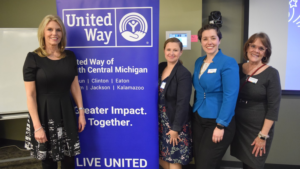A dramatic decline in teen pregnancies proves the power of partnership to tackle one of the biggest social challenges in Jackson County.

“When teenagers become parents, they’re less likely to finish school, more likely to live in poverty, and often pass along health and economic problems to their children,” said Michelle White, Director of Health Education and Health Promotion at the Jackson County Health Department.
In 2003, more than 78 of every 1,000 females ages 15-19 in Jackson County became pregnant. While lower than the high mark—the rate hit nearly 114 per 1,000 in 1990—it remained far too high. In fact, Jackson County ranked a disappointing 78th out of 83 counties in Michigan due to its inability to reduce teen pregnancy.
By 2006, the Health Department and United Way of Jackson County pulled together a coalition of nonprofit and educational organizations to form the Teen Pregnancy Prevention Initiative. As TPPI’s first coordinator, White aimed to bring teen pregnancy out of the shadows.
“For many adults, the topic was uncomfortable,” White said. “There was this mistaken notion that if we talk with teens about sex, they’ll go out and do it. But the opposite is true: When we provide opportunities for dialogue, answer questions and promote understanding, teens can make informed decisions.”
Being peer-led, TPPI removes barriers to dialogue, said Kaitlyn Stein, current TPPI Coordinator.
“The biggest impact comes from our Teen Advisory Council,” she explained. “We evaluate abstinence and comprehensive sex education programs at the state level. However, locally we’re getting feedback right from the teens on what works. That’s driving meaningful programs and better outcomes.”
Among the efforts by TPPI:
- Teen outreach programs at middle and high schools provide dialogue, promote self-esteem and awareness, and equip teens to make right choices.
- Social and community service events connect teens, helping them build positive relationships and build service-oriented mindsets.
- The “I Wish” video series, a locally produced documentary, presents the challenges faced by teen parents. TPPI has issued two installments of the series.
- Parental engagement helps equip parents to have constructive conversations with their children about positive sexual health.
Stein said TPPI, coupled with crucial, consistent state funding of both abstinence and comprehensive sex education programs, prompted a huge drop in teen pregnancies in Jackson County—a 58 percent reduction between 2003 and 2015, the latest statistics available. The local teen pregnancy rate now stands at 33.1 per 1,000, improving Jackson County’s ranking to 48th in Michigan.
While that’s cause for celebration, the partners remain focused on doing more.
“Teen pregnancy is a significant driver of generational poverty. That fact has near- and long-term implications for our economy and our fellow citizens,” said Ken Toll, President & CEO of United Way of Jackson County. “A decade ago, a lot of people told us that teen pregnancy was a bigger problem than we could handle. But in reality, TPPI is a fantastic example of partnership having a huge, positive impact in our community.”
Toll said TPPI shows how collaboration and systems change can be transformational.
“Our focus at United Way is on eliminating poverty in Jackson County,” he said. “The more we can work together with local partners and resources, with state partners such as the Michigan Department of Health and Human Services, and with teens and parents to educate and equip, the more progress we make to improve individual lives and the entire community.”
To learn more about TPPI, including how to order the “I Wish” video series, go to www.tppijackson.org.










